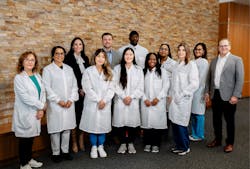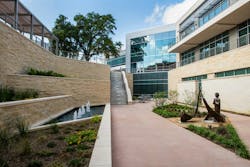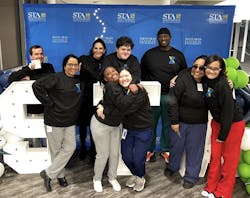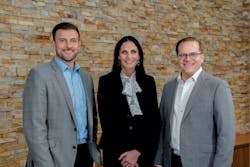2024 Lab of the Year Runner Up: Southwest Transplant Alliance Laboratory Services
Southwest Transplant Alliance (STA) Laboratory Services is one of MLO’s 2024 Lab of the Year Runner Ups! STA is one of the largest federally designated organ procurement organizations in the United States. Located in Dallas, Texas, STA’s service area includes 10 hospital transplant centers, over 270 hospitals, 89 Texas counties, and one Arkansas county. They serve a population of more than 10.5 million people, honoring heroic donors, courageous donor families, and those on the transplant waiting list. Over the last 50 years, STA has recovered more than 35,000 organs and saved more than 100,000 people. The laboratory provides timely testing for donors giving the gift of life, including a variety of clinical testing on viability of organs, any infectious diseases, and compatibility testing.
STA’s mission is to save lives through donation. They operate 24 hours a day, 365 days a year and perform over 66,000 specialized tests annually. The laboratory specializes in infectious disease/serology for organ and tissue donors, chemistry, hematology, urinalysis, coagulation, special chemistry, molecular, NAT, histocompatibility (HLA and ABO), histology, and microbiology. The organization is regulated by Clinical Laboratory Improvement Amendments (CLIA), College of American Pathologists (CAP), Food and Drug Administration (FDA), American Association of Tissue Banks (AATB), and Eye Bank Association of America (EBAA).
Opportunities
STA saw opportunities for improvement in these categories:
• Discarded organs: Of the 25 expedited cases for 2022 that were reviewed, 92 organs were unable to be transplanted due to time restraints. This resulted in many missed opportunities and discarded organs.
• Turnaround time: Lab average turnaround time in 2022 for infectious disease serologies was 7.67 hours, up from an average of 4–6 hours. If there were any repeats, it could take up to 12 hours.
• Staff stress: The STA staff performed a lot of hands-on testing with a good deal of manual pipetting, which complicated processes dictated by timers.
• User errors: There were user errors due to manual entry of results and lots of paperwork tracking each step.
• High costs: For the volume of testing, staffing and reagent costs were high. Several test kits would only have a small part used, resulting in over 400 tests being discarded after two weeks.
2023 accomplishments
STA’s laboratory aims to minimize the testing turnaround time, providing more opportunities to save lives through organ donation. In 2023, they accomplished that goal by improving turnaround time (TAT) and confidence in the lab’s TAT. They decreased the stress on their staff resulting in improvements in staff satisfaction. This led to reduced costs and errors.
Specifically, STA validated the following specialties:
• Human leukocyte antigens (HLA) typing
• Hematology
• Coagulation
• Diasorin Liaison brought in and validated 9 assays
• Epredia Cryostat validated for frozen sections
• Chagas blood test
• 3 new EPOC blood gas analyzers validated for use in the donor care unit
• Microbiology - blood cultures validated to reduced TAT and recipient outcomes
STA said the implementation of the Diasorin Liaison XL made the biggest impact in their laboratory. STA was doing all testing manually and wanted a platform that could perform all their organ serology testing needs.
Southwest Transplant Alliance saved $297,000 in 2023 on reagents and hands-on tech time after switching to an automated platform. An additional $110,000 was saved by internalizing coagulation, hematology, and microbiology.
Three of STA’s strategic goals are to create a culture of joy, act as a catalyst for donation, and be a center of excellence. They achieved CAP accreditation in 2023. They lowered organ donor serology testing from 7.67 hours to about 37 minutes! To accomplish this, they separated organ donor testing from tissue donor testing. Doing this resulted in the opportunity to save more lives.
Employee training and updates to policies reduced sample hold times down to 15 in November versus more than 50, 3% holds versus an average of 16%. To remove identical orders, an LIS rule was written. Another improvement was made to the ABO subtyping workflow, allowing for better outcomes for transplant recipients. To decrease errors, the report structure was changed to match documentation formatting in the donor record. Three new IQCPs were put into action, resulting in cost savings and increased staff satisfaction. In addition, employee engagement action plans were implemented, increasing engagement scores in nearly every category.
Teamwork
STA has five core values: passionate, selfless, trustworthy, collaborative, and creative. The following departments collaborated to accomplish STA’s 2023 goals: Finance, Leadership, Project Management, Facilities, Quality, Education, Information Technology, Clinical, and the external LIS Admin teams.
To help create a culture of joy, they introduced a new automated platform to replace manual testing. STA said, “The burden on the staff has been significantly reduced, allowing them to focus on other critical areas in the laboratory. This has not only resulted in increased efficiency, but also mitigated the risk of human error. Manual testing requires extensive attention to detail, concentration, and dexterity. The pressure to avoid errors and ensure accurate results can be overwhelming, causing high stress levels that can impede productivity and even compromise the quality of testing. The new platform has successfully eliminated much of the burden faced by the staff. As a result, the staff can allocate their time and expertise to other crucial aspects of the laboratory operations.”
STA saved $142,598.82 on their annual reagent costs and had a 92% turnaround time improvement on their infectious disease assays. The decrease in turnaround time led to staff confidence, which leads to employee satisfaction and retention. In addition, these improvements open doors to countless opportunities for hope and healing.









